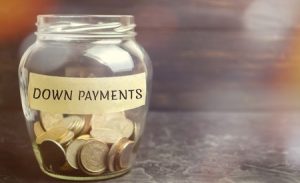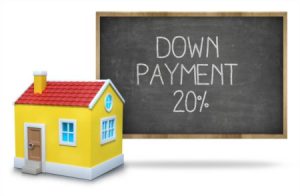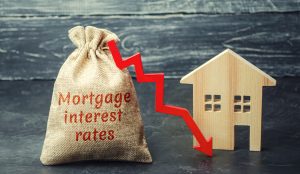How much down payment do you need to buy a home?

Your down payment plays an important role when buying a home. Lenders often view the down payment as your investment in the home. Not only will this affect how much you need to borrow, but it can also influence:
- If your lender will ask you to pay for private mortgage insurance (PMI). Generally, you will need PMI if you deposit less than 20% of the home purchase price.
- Your interest rate. Because your down payment represents your investment in your home, your lender will often offer you a lower rate if you can make a larger down payment.
So what down payment will you have to make? It depends on the purchase price of your home and your loan program. Different loan programs require different percentages, which typically range from 5% to 20%.
Table of Contents
What is a Down Payment?

A down payment is the money you pay upfront to buy a home. It’s your share of the land, your first jump to homeownership, and your chance to reduce the amount you need to borrow from a lender.
What is the minimum down payment required?
For most mortgages, the minimum required down payment is 3%. It may sound tempting upfront, but make no mistake. This is actually a very low amount, not to mention a surefire way to end up upside down on a house. And you will lose a lot of money in interest over the life of your mortgage.
If your ultimate goal is to own a debt-free home, aim for a 20% down payment, or around $ 40,000, depending on the size and price of the home you want. If you haven’t saved 20% after two or three years of heavy savings, lower your goal to 15% or 10%. But don’t go below 10%. It’s not worth trying!
Whatever you do, don’t even think about settling for government-guaranteed mortgage traps, also known as FHA and VA loans. At first glance, these loans may seem attractive (you can’t deposit almost anything) but they come with higher interest rates and mortgage insurance payments.
Calculate your down payment

The total down payment depends on the purchase price of your home and the percentage your lender wants you to spend on your home. As an example, we’ll look at a $ 300,000 house with three different down payment percentages: a 30% down payment, a 10% down payment, and a 3.5% down payment.
On a $ 300,000 home, the down payments would be:
- 30 percent: $ 90,000
- 10 percent: $ 30,000
- 3.5 percent: $ 10,500
You can use a down payment calculator to help you set your financial expectations based on the type and terms of your loan.
It is important to note that the type of mortgage you apply for will affect your down payment. For example, customers with excellent credit may qualify for a down payment as low as 3.5% with a loan from the Federal Housing Administration (FHA). However, buyers with weaker credit histories may be required to deposit 10%. Also, if you are applying for a jumbo loan (a loan that exceeds the conventional loan standards set by Fannie Mae and Freddie Mac), you will likely need to provide a larger down payment.
Also, if you qualify for a USDA loan or Veterans Affairs loan, you may be eligible to buy a home without a down payment.
Do you really need a 20% down payment on a house?

There are very good reasons to seek a 20% down payment when buying a home. If you can save that amount, most lenders don’t require you to pay for private mortgage insurance (PMI; more on that below). Plus, with a 20% down payment, you are likely to be offered lower interest rates on your mortgage. You get these benefits because, with a substantial stake in the home, you are less likely to default on your mortgage. After all, if you did, you would lose a great deal of money.
How to buy a house with less than 20% down payment?
If your down payment is less than 20%, your loan-to-value ratio for conventional financing will be greater than 80%. In this case, your lender may ask you to pay for private mortgage insurance because they are lending you more money to buy the home and increasing the potential risk of loss. Remember, private mortgage insurance will increase your monthly payments.
When considering how much to invest in your home, think about your lender’s requirements and what a higher or lower down payment will mean to you. Is it worth paying for private mortgage insurance each month to enjoy the other benefits of homeownership? Or would it make more sense for you to save for a larger down payment and avoid PMI, even if it means waiting longer to buy a home? Knowing the financial impact of each choice can help you make a decision with confidence.
If you’re having trouble saving for a down payment, be aware that some lenders participate in programs that may qualify you for down payment assistance. Consult your lender to ask if you qualify for any of these programs.
Why do mortgage lenders require a down payment?

When you purchase a home, your lender faces a large sum of money (usually hundreds of thousands of dollars). The deposit is proof of good faith on the part of the buyer. This payment shows the lender that you intend to return the money to the lender.
If you miss payments or foreclose on the house, the bank could lose a lot of money. The down payment helps offset some of your risks by providing cash upfront.
If you offer a down payment of less than 20%, your lender may require you to pay private mortgage insurance until you have made a payment equal to 20% of your home’s equity.
How does the size of your down payment impact your mortgage?

Simply put, the amount of money you deposit upfront affects the amount you pay for your home. The general rule of thumb for down payments is this: a smaller down payment means you are spending more on your home; a larger down payment means you spend less.
Why is this true? Because the amount of your down payment determines three things: the need for private mortgage insurance (also known as PMI), your monthly mortgage payment, and the total cost of interest.
How does the size of your initial payment affect PMI?

If your down payment is less than 20%, you must pay for private mortgage insurance (PMI), a type of insurance that protects your lender if you default on your loan.
You will pay the PMI each month, as an insurance premium, until you have paid 20% of the value of your home. The PMI can cost between 0.5% and 1% of the entire loan. This means that if you have a 5% down payment on a $ 225,000 home, you will pay at least $ 89 per month for PMI. That’s $ 1,068 for the first year!
Yes, it is a lot of money to spend on insurance. And the worst? You can say goodbye to that money. There is no return, no investment, and only after you have paid 20% of your home’s value can you ask your lender if you can stop paying the PMI. Even then, there is no guarantee that you can do this, as every lender is different.
How does this affect monthly mortgage payments?

When you have a larger down payment, you borrow less. And when you borrow less, you generally make smaller monthly mortgage payments, depending on the loan.
Let’s say you get a conventional 15-year mortgage on a $ 225,000 home. With a 20% down payment, you will need to borrow $ 180,000. This means that each month you pay $ 1,578.
Now, what if you only put in 3%? You will pay $ 1,945 per month or $ 400 more. It may not seem like much right now until you or your spouse lose your job. Suddenly, you could use that extra $ 400 per month.
Why should you make a big down payment?

Saving for a down payment can be one of the most difficult and frustrating parts of buying a home. But patience and perseverance pay off: a long time. Remember, a lower down payment doesn’t save you money. Be aware of the higher interest rates and high fees associated with this mortgage option, and you will end up paying more than your home is worth. And that is never a good idea.
Advantages
If you’re saving for a down payment and haven’t reached at least 10%, don’t stop now. Practice a little deferred tipping. Putting in the 20% will be worth the hard work for six important reasons. You will
- pay for your house faster.
- not have to pay PMI.
- likely get a lower interest rate.
- have a better chance of getting a mortgage.
- make smaller monthly payments.
- stand out as a competitive buyer.
Once you’ve saved for your down payment, the last thing you want to do is spend it all on a bad investment. That is why it is extremely important to contact a real estate agent who knows your local market and can help you get the most for your money. Even if you’re still saving, contact a real estate agent today.
Variations on requirements

The requirements for newly built homes are almost always the same as for an existing home, but there are two possible exceptions.
Custom-built homes
Many new construction homes are production homes built-in high volume by residential construction companies. These are not generally considered custom homes, although they do come with many custom options.
A real custom home means that buyers have obtained financing to buy land and have hired a builder, and often an architect, to build a home especially for them. In this case, the lender will generally require a larger down payment since the house does not exist yet.
When a buyer is responsible for financing construction costs, as required by custom homes, buyers tend to use a permanent construction loan. The terms of this loan set the conditions for a down payment greater than that of an existing new home.
Condos and Townhomes
The second exception is for newly built condos or townhomes.
Whether a buyer needs a larger or smaller down payment in this situation depends on the lender’s guidelines, the type of loan, the location of the property, and the proportion of units that have previously been sold during the construction phase.
Also, not all condos or townhomes are FHA, VA. Fannie Mae or Freddie Mac qualified. If you plan to buy a condo or townhome, be sure to check with your lender to see if the loan allows these types of houses.
Final Thoughts
In recent weeks, mortgage rates have been lowered to help offset the damage to the market created by the COVID-19 restrictions. Lower rates present an excellent option for current owners to refinance their existing property and, for new buyers, to obtain a lower interest rate. Homebuyers and owners should be aware that many lenders are tightening their requirements to reduce risk in this current climate. If you have a big down payment and a clean credit history, this might be a good time to consider buying a home.
Ultimately, most people don’t need a large down payment to buy a home, and some don’t need it at all. Talk to a lender for more information. With so many loan programs available to you, the opportunity to buy a new home is closer than you might think.






Leave a Reply